Taliban Confirms Foreign Minister Met Rebel Leader In Tehran
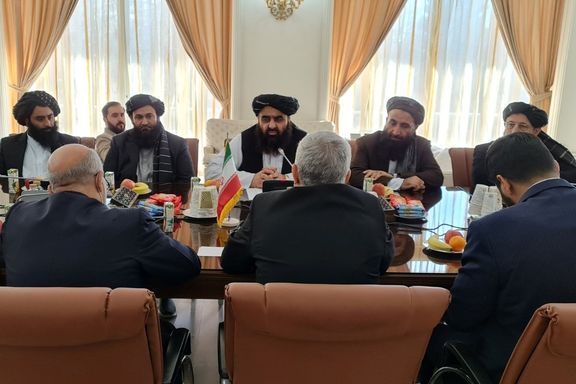
The Taliban has confirmed that acting foreign minister Amir Khan Muttaqi met with opposition figure Ahmad Massoud during his visit to Iran.

The Taliban has confirmed that acting foreign minister Amir Khan Muttaqi met with opposition figure Ahmad Massoud during his visit to Iran.
Muttaqi saw both the leader of the National Resistance Front and Herat governor Mohammad Ismail Khan while in Tehran, Zabiullah Mujahid, the Taliban’s main spokesman and acting deputy information minister, tweeted on Monday.
Mujahid wrote that Muttaqi had assured them that they could “return home without any worries.” Massoud has been widely touted as a leader who might rally military resistance to Afghanistan’s new rulers.
The meeting with Massoud was also confirmed by Bilal Karimi, the Taliban deputy spokesman, who said both men had been urged to go home to live peacefully.
Muttaqi also met with Iranian Foreign Minister Hossein Amir-Abdollahian and Hassan Kazemi Qami, the Iranian president's special Afghan envoy. On Monday, Iran’s foreign ministry spokesman Saeed Khatibzadeh said Iran had “hosted various Afghan groups on various occasions.”
Afghanistan International had quoted unnamed sources saying that Mutaqqi had arrived in Tehran on the invitation of the Islamic Revolution Guard Corps (IRGC) and would meet opposition figures, including Massoud snd Ismail Khan, who tried to rally anti-Taliban forces in July in Herat.
A photo taken in Kabul airport before his departure showed a Mahan airline plane waiting on the tarmac. Mahan is an IRGC-affiliated company.
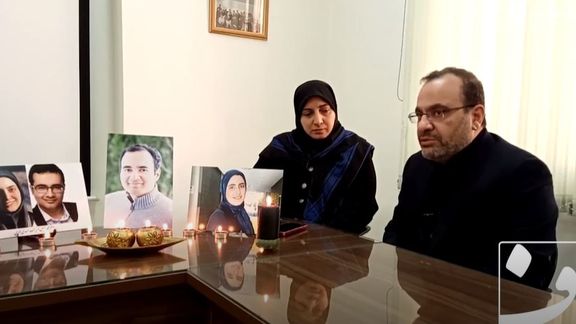
The mother of two victims killed when Iran shot down an airliner in 2020 says the family has sued senior officials for what they call a ‘premediated act.’
In a new interview published Monday in the reformist newspaper Shargh, Zahra Majd and her husband Hossein Asadi-Lari, who lost their children when flight PS752 was shot down January 8, 2020, disclosed their family had sued Ali Shamkhani, Secretary of the Supreme National Security Council (SNSC), and Hossein Salami, commander-in-chief of the Revolutionary Guards (IRGC).
Iran has said the Ukrainian Airways plane was shot down because a of “human error” at a time of high alert due to a possible United States attack, leading to the civilian airliner being misidentified. The lawsuit brought against Shamkhani claims the SNSC was responsible for not closing Iran’s airspace on the day of the incident and was involved in the deliberate downing of the plane.
The IRGC Aerospace Commander Amir-Ali Hajizadeh took overall responsibility for the downing of the plane three days after the incident.
Monday’s interview came a day after the publication of the family's two other interviews with Ensaf News and the Iranian Students News Agency (ISNA), when the family, breaking a silence of two years, alleged the missiles were intentionally fired at the plane to prevent US retaliation against Iran for a missile attack on US bases in Iraq just hours earlier, itself in response for the US killing Iranian general Qasem Soleimani and nine others in Baghdad.
Majd told Shargh that over a month after the incident, when visiting to express condolences, a visit implying he expected the family to accept their loss with stoicism, Salami had said the incident had prevented 10 million from being killed in a war with the US, making her children martyrs.
The family believes Salami's remarks, which he asked them to keep confidential, proves the flight was downed intentionally and not through human error.
This is the first time that one of the victims' families living in Iran has made such allegations in press interviews. Mohsen Asadi-Lari is a former high-ranking health ministry official.
Majd and her husband said that for three days after January 8 they had refused to believe that the plane had been targeted by Iran’s defense forces. Majd complained that the state broadcaster (IRIB) never talked to victims' families even though they had shunned foreign media, which she alleged would distort their remarks.
But she told Shargh that she would not talk to IRIB even if asked. “They will manipulate it to get what they want even if they talk to us," she told Shargh, accusing authorities of rigidly controlling the trial and court sessions, as well as private memorial ceremonies held by families and inscriptions on victims' gravestones. "We are not free to do and talk as we want."
Majd and her husband insisted that the ten low-ranking military personnel on trial are not the real culprits. Her husband claimed the person named as the operator of the air-defense system, referred to by the initials M.KH, was an expert in the Tor-M1 surface-to-air system that shot down the plane and that it was unbelievable that he had made such an error.”
"Hajizadeh [the IRGC aerospace commander] was indicted but his prosecution was prohibited,” Majd told Shargh. “This is very important. He has been indicted but [will not be prosecuted] no matter how much we shout… We found out about this in our private meeting [with the judge presiding the trial].”
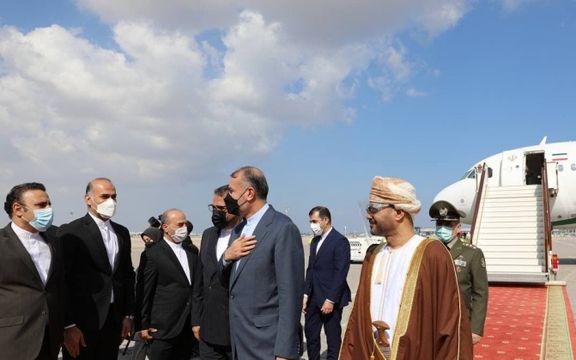
Iran’s foreign minister has traveled to Oman to discuss issues of mutual interest while Muscat has traditionally played a mediating role between Tehran and Washington.
According to Iran’s foreign ministry, the visit by Tehran’s high-ranking delegation may have another stop in one of the Persian Gulf countries, and Hossein Amir-Abdollahian is also set to go to China in the coming days.
Amir-Abdollahian met with Oman’s Deputy Prime Minister Sayyid Fahd bin Mahmoud Al Said on Monday and is also held a meeting with his counterpart Sayyid Badr Albusaidi.
Upon arrival in Muscat, Amir-Abdollahian mentioned following up on the quadripartite transit agreement with Turkmenistan and Uzbekistan as one of the topics on agenda, probably implying that increasing economic and trade cooperation with Oman is the focus of the visit.
However, IRNA says he is accompanied by “a political delegation” from the ministry.
Foreign ministry spokesman Saeed Khatibzadeh said on Monday that the other possible destination would be announced if the visit takes place.
The second possible destination could be Qatar, as there has been speculation that Doha is liaising between the US and the Islamic Republic.
Amir-Abdollahian is also set to travel to China in a few days to discuss the surreptitious 25-year strategic cooperation agreement between Tehran and Beijing.
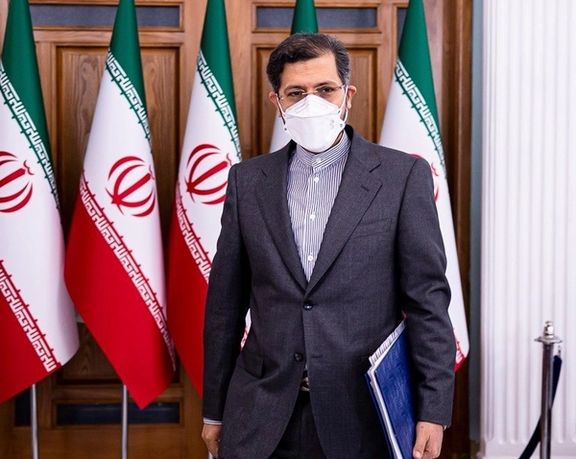
Iran says the next round of talks with Saudi Arabia is on agenda but the presence of Saudi Arabia’s diplomats in Vienna is not related to the Islamic Republic.
During his weekly press briefing on Monday, Foreign Ministry spokesman Saeed Khatibzadeh said that the next round of talks will be hosted by Iraq but did not mention a date.
Dodging a question whether Saudi Arabia's position on Lebanon and Hezbollah has any impact on the talks, Khatibzadeh said that “We have tried to continue our relations and talks despite the differences.
Khatibzadeh also sidestepped a question about the presence of a Saudi delegation in Vienna while Iran and world powers are negotiating to revive the 2015 nuclear deal, saying this Tehran had no role in it.
On Saturday, US Special Envoy for Iran Rob Malley met with Saudi Arabia’s ambassador to the international organizations to discuss the latest developments in Iran nuclear talks.
Recently, Tehran has been saying that a new round of Iran-Saudi negotiations will take place, but Riyadh has been so far silent.
Last week, Saudi Arabia’s foreign minister Prince Faisal bin Farhan Al Saud reiterated Riyadh’s concerns about Iran’s “destabilizing role” and “transgressions” in its nuclear program.
Riyadh and Tehran held talks last year to reduce tensions with the aim of restoring diplomatic ties broken since January 2016. So far, the talks have been exploratory with no tangible results.
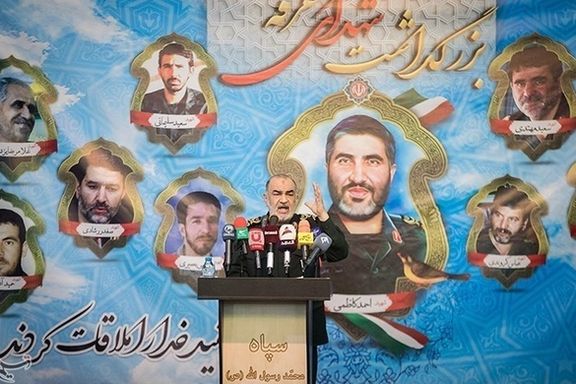
One day after the White House warned Iran against harming any Americans, the commander of IRGC said Monday that revenge for the killing of Qasem Soleimani is not yet complete.
In a ceremony in Tehran, Hossein Salami without referring to the warning by US national security advisor Jake Sullivan, said, “We have taken part of the revenge and part of it is still unfulfilled, and everyone certainly knows it. American officials should know that they cannot conduct aggression against a nation and avoid revenge.”
General Soleimani, who was Iran’s top military and intelligence operator in the region organizing militant proxy forces, was killed by a decision of the United States in a drone strike in Baghdad on January 3, 2020. Iran retaliated by firing ballistic missiles at bases in Iraq hosting US troops five days later.
On Saturday, Iran issued a new list of Americans it considers responsible for Soleimani’s killing after senior officials had repeatedly mentioned revenge all week, on the second anniversary of his death.
Sullivan in his Sunday statement warned Tehran of “severe consequences” if it attacks Americans. "We will work with our allies and partners to deter and respond to any attacks carried out by Iran," he said. "Should Iran attack any of our nationals, including any of the 51 people named yesterday, it will face severe consequences."
Salami on Monday did not mention Sullivan’s statement. In fact, government-controlled media and officials were silent Monday morning, ignoring the White House warning. But Salami’s explicit remarks about unfinished revenge seems to be an indirect response to Sullivan’s warning.
In his speech, Salami also claimed the Islamic Republic has succeeded in uniting “Muslims in the region” against the United States. Often when Iranian officials use the word ‘Muslims’ the underlying meaning is Shiites, not necessarily Sunnis, who do not regard Iran’s clerics as their religious leaders.
Except the Palestinian Hamas, most of Iran’s allies and proxies in Iraq, Syria and Yemen are Shiites or sects close to Iran’s brand of Shiism.
The IRGC commander also took credit for strengthening the Lebanese Hezbollah and “arming Palestine”, which was able “to fight big wars with Israel.”
Overall, Salami’s remarks included more religious metaphors than ever before, abundant praise for “martyrs” and “jihad”. He said the battle against “arrogance”, a term used mainly to refer to the United States, has gone beyond Iran’s borders and has united Muslims.
In an implicit reference to Tehran’s influence in Iraq, Syria, Lebanon and Yemen, Salami said, “The Islamic revolution has conquered large expanses of territory and many hearts and the enemy is in retreat.”
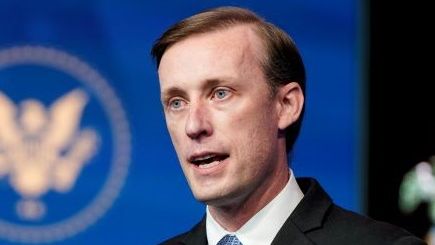
Iran will face severe consequences if it attacks Americans, the White House said on Sunday, including former officials sanctioned by Tehran for the 2020 killing of Gen. Qasem Soleimani in a drone strike.
White House National Security Adviser Jake Sullivan said Iran's sanctions on Saturday came as Tehran's proxy militias continue to attack American troops in the Middle East.
"We will work with our allies and partners to deter and respond to any attacks carried out by Iran," Sullivan said in a statement. "Should Iran attack any of our nationals, including any of the 52 people named yesterday, it will face severe consequences."
Top Iranian officials have repeatedly issued threats to take revenge for Soleimani’s killing. The Qods Force general was Iran’s top military and intelligence operator in the region, organizing and guiding militant proxies.
The US warning came as nuclear talks continue in Vienna to restore the 2015 nuclear agreement, which would lift US sanctions and restrict Iran’s fast-developing nuclear program. Iran has refused to directly negotiate with the United States. Other participants in the talks act as mediators.
Iran on Saturday imposed sanctions on dozens more Americans, many of them from the US military, over the 2020 killing of Soleimani.
Iran's Foreign Ministry said 51 Americans had been targeted for what it called "terrorism" and human rights violations. The step lets Iranian authorities seize any assets they hold in Iran, but the apparent absence of such assets means it will likely be symbolic.
It was not clear why Sullivan's statement referred to 52 people when Tehran said it had sanctioned 51.
Iran’s Supreme Leader Ali Khamenei on January 1 lashed out at former US president Donald Trump and others for Soleimani’s killing, saying they “will pay back for their crime.” Other Iranian officials have repeated similar threats in the past week as Tehran marked the second anniversary of Soleimani’s death.
Iran-backed militias in Iraq and Syria accelerated drone and rocker attacks on US forces in the first week of January.
Iran's sanctions include former president Donald Trump, former CIA directors Mike Pompeo and Gina Haspel, former UN envoy John Bolton, former defense secretaries Mark Esper and Christopher C. Miller. The list also included US General Mark Milley, chairman of the Joint Chiefs of Staff and former White House national security adviser Robert O'Brien.
Soleimani, was killed in Iraq in a drone strike on Jan. 3, 2020, ordered by then President Donald Trump, who said he had to eliminate a “terrorist leader” who posed an immediate danger to Americans.
With reporting by Reuters